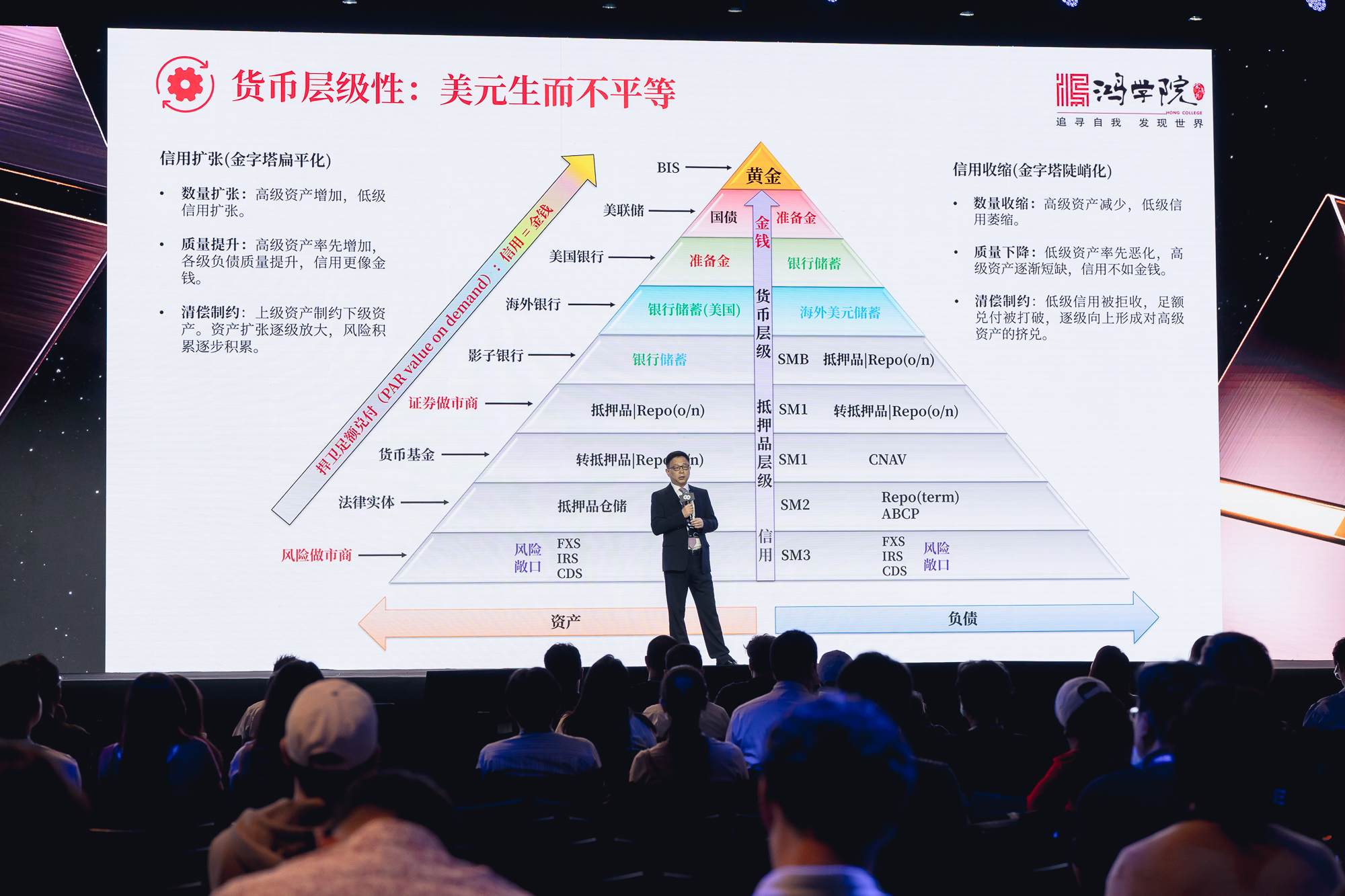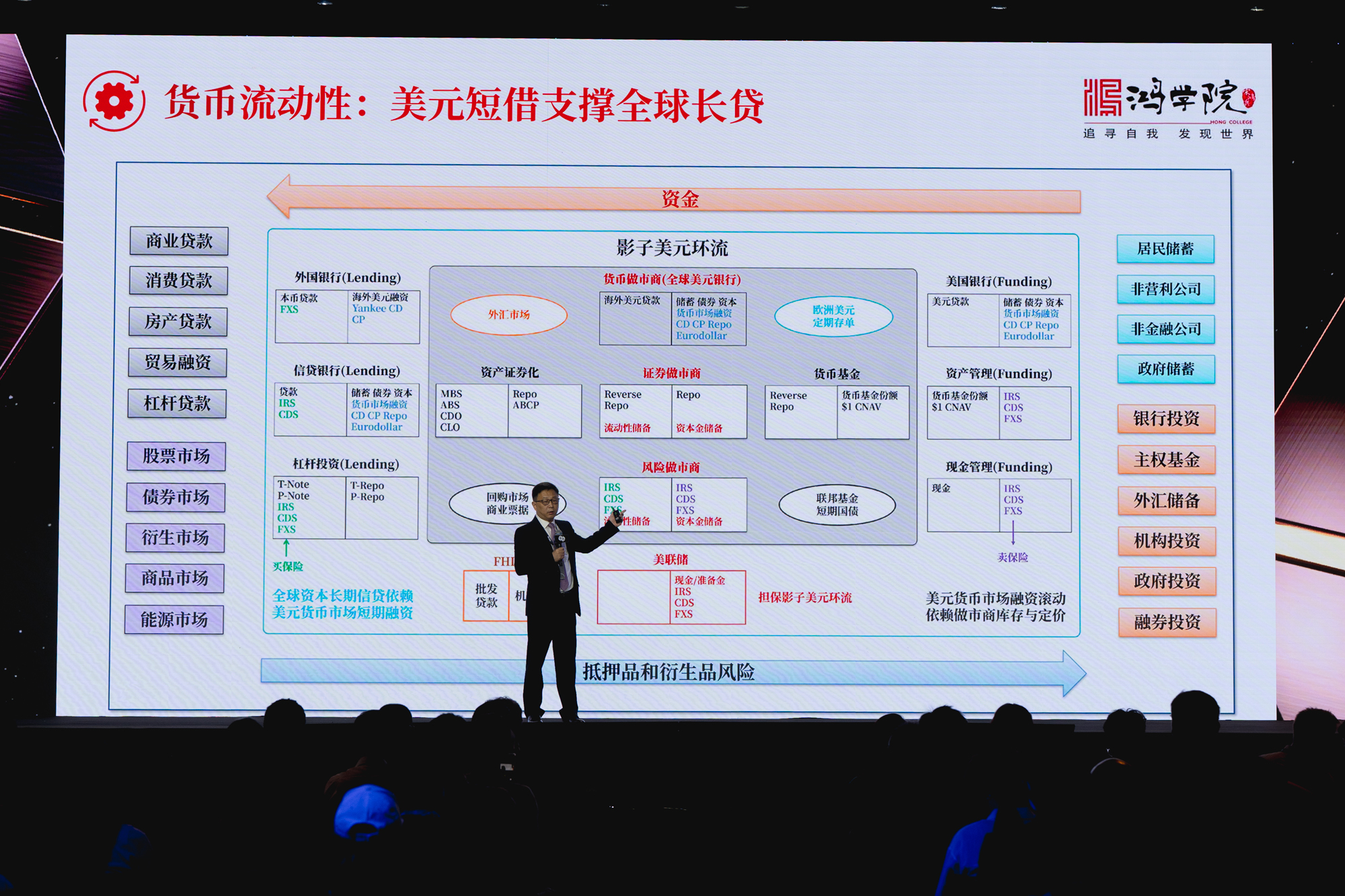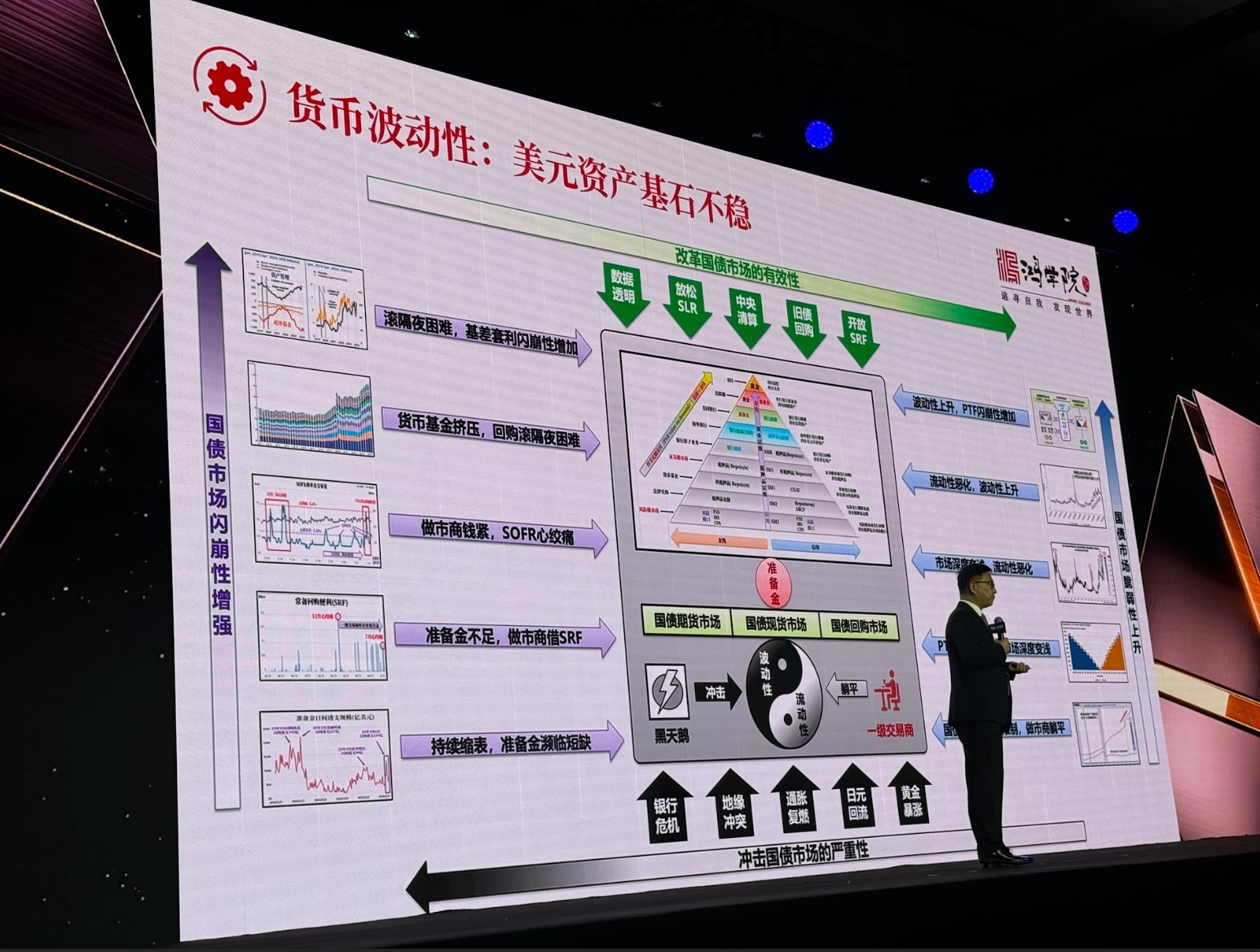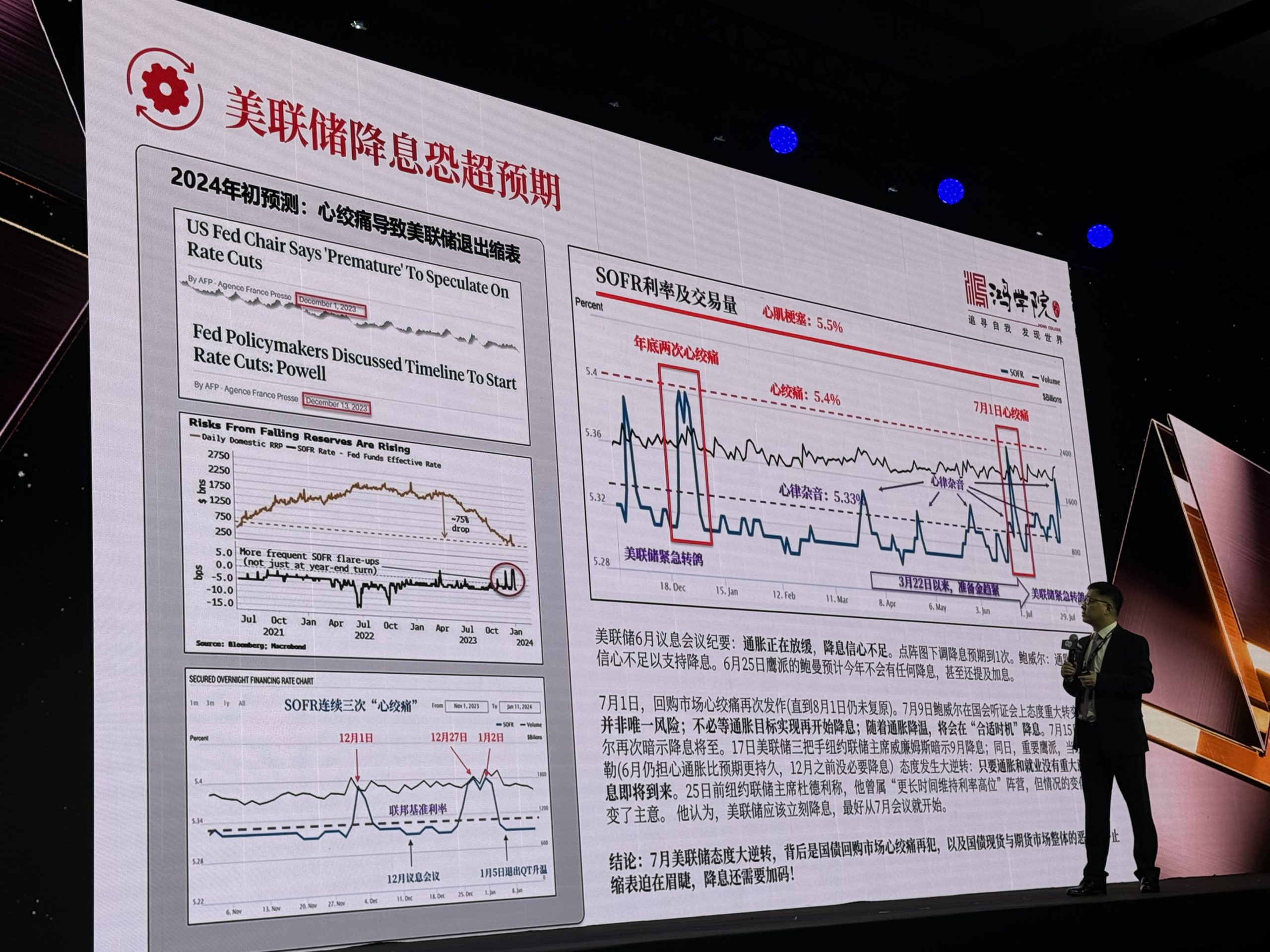The economic best-selling book " Currency Wars" is still popular around the world since its release in 2007. The author Song Hongbing delivered a speech at the 2024 Asia Blockchain Summit with the theme "Currency Wars: US Dollar vs Gold and Digital Currency" 》Wonderful sharing.
Song Hongbing deeply analyzed the inherent crisis faced by the U.S. dollar system, the global currency hegemon after the 2020 COVID-19 epidemic, and provided rich picture briefings to help the audience understand the structural problems existing in legal currencies such as the U.S. dollar. The following is a summary of Teacher Song’s remarks for you The essence of the speech.
After 2017 , a currency world war has broken out in various countries around the world. I think the entire monetary system dominated by the US dollar actually has structural problems, or an inherent crisis. I will summarize it in four sentences. These four sentences respectively summarize the inherent contradictions in the current monetary system.
Currencies are inherently unequal, and the flow of dollars has short and long periods. Assets are prone to fluctuations if they are in danger, and hegemony cannot be stable for a long time due to greed.

Currency hierarchy: The dollar is not created equal
We know that the rise of Bitcoin is precisely because of the discovery of contradictions in the monetary system, including the rise in gold prices, which illustrates the serious problems existing in today's monetary system, and I think it is continuing to develop in the direction of deterioration.
No matter whether it is New Taiwan dollars, US dollars or RMB, money is actually different. The NT$ 1 million you deposit in the bank is not the same concept as the NT$ 1 million of the Central Bank of Taiwan. They are not legally equal. In fact, in a bank, the money you deposit is called private currency, or money created by the bank. In the central bank, this money is a reserve, and its legal status is higher than yours.
I use a pyramid to draw out the levels of currency, and we think of it like a balance sheet. On the left are assets, on the right are liabilities, and then there are the assets and corresponding liabilities owned by financial institutions at each level.
You'll find at the top end, like the Bank for International Settlements, they can use gold for clearing between central banks. Then there is the Federal Reserve, which uses Treasury bonds as its main asset to create reserves. Then there are the banks in the United States. Of course, this is true for the banking systems of all countries. The reserves are then used to create bank deposits, and your money is on one level, and then further down is the overseas bank.
For banks in Taiwan, your clearing bank in the United States is equivalent to the central bank of the U.S. dollar overseas. Further down, the banking system will also play the role of the central bank in the shadow banking system, and the shadow banking system is divided into several layers.
So when we talk about 1 US dollar, or 1 Taiwan dollar, you must understand at which level you are talking?
Few people realize that this is a problem. In fact, the security of all financial systems lies in ensuring every level. The subordinates call the superiors credit, and the superiors call them your senior assets.
The entire system is to ensure that the ratio between subordinates and superiors can be maintained at 1: 1 . If the ratio cannot be maintained, the system will collapse.

Why did the financial crisis break out?
We can think of it as a " credit expansion process ." We can imagine the credit expansion process as a pyramid widening and flattening. In this process, we will see that the quantity will expand , that is, the scale of assets and credit will expand. Quality will improve because with more money, all assets become good assets.
What needs to be realized is that in fact, each level has a repayment restriction effect on the next level, but the real work is at the level above you. For example, for a bank, it clears at the central bank. If you pay, But if the liquidation cannot be completed, that is, if your assets at the higher level are not enough, you will immediately default or be declared bankrupt.
When you expand credit, the pyramid becomes wider and flatter, and asset quality will decline to a certain extent because people who can borrow money and people with good credit have all borrowed. At this time, the entire financial system begins to show signs of default. If it is over-expanded, the financial system will enter a state of contraction.
The contracted state is a completely opposite state. Quantity shrinks, quality declines, and then due to liquidity constraints, banks go bankrupt, and people will run on them. During the run, the entire low-grade credit will be abandoned. No one is willing to ask for the credit issued by this bank. Everyone only wants higher-grade currency, so this is called a bank run .
In my opinion, the essential development trend of this financial system is that every time it expands, it becomes flat and the scale becomes larger and larger. Then, when it shrinks, it causes very serious economic problems and a large number of runs, which finally destroys the system. Getting bigger and bigger.
Think about it, the Fed's balance sheet before the financial crisis was only $ 800 billion before 2008 , which could sustain all competition. Why is it now more than $7 trillion ? Why has it increased 10 times? It's because this pyramid has become very wide and cannot shrink. It has become very rigid and cannot shrink anymore.
Then, all the ways of making money in the financial system are the normal profit models in which the return rate of assets on the left is higher than the return rate of liabilities on the right. But if this model becomes infinitely larger, it means that the financial system changes from the real economy to the industry. Making more and more money.
If things go on like this, the industry will no longer be able to develop because all your profits have been taken away, so this is equivalent to a financial system and a tax system. The larger its scale, the greater the oppression on the real economy. Or if you double the tax, the tax will be higher.
So everyone remember one sentence:
Currency is inherently unequal and hierarchical.
Monetary liquidity: short-term U.S. dollar borrowing supports global long-term lending
This picture completely covers all the operating mechanisms from traditional banks to shadow banks. We, the people who save money, and all kinds of people who save money are on the right. All the people who need money are on the left. A lot of money is actually moving from the left to the right through traditional banks and the shadow banking system.
If we sum up today's currency flows, or the flow of US dollars, in one sentence, it means the assets of various countries, or the expansion of credit. Long-term loans rely on the United States' overnight repurchases, which is the most central one. Shadow banking is actually the engine that creates U.S. dollar liquidity. This repo market actually plays the role of overnight lending.
Whether you lend in Taiwan, Japan or Mainland China, your loan is long-term, but all these long-term assets rely on the heart of the US dollar, which is provided to you overnight. This is the most fundamental weakness.
Because this system is naturally unstable, the reason is that once I cannot roll it overnight, my borrowing funds are for one day, and the interest rate is very low. My lending here is for several years, so my rate of return is very high. , under normal circumstances, there is a very good return between the two, but if you roll over overnight, you will not be able to borrow money on the second day, and a major financial crisis will break out in the entire system.
Your credit expansion around the world is getting bigger and bigger, and your asset scale is getting bigger and bigger, but your source of funds is getting more and more fragile, relying on ultra-short-term overnight borrowings. Think about it, if something goes wrong overnight , wouldn’t the entire system collapse?
This is actually the biggest problem. This is that global credit expansion or global economic development all depends on ultra-short-term borrowing.

Currency Volatility: The U.S. Dollar’s Asset Base Is Unstable
The financial system is like a very complex pipeline like a car. For ordinary people, we can only see that Taiwan's stock market fell by 8% yesterday, and Japan's stock market fell by 12% yesterday, with circuit breakers twice. But what caused this circuit break? What causes the stock market, the bond market, and the prices of all financial assets to fluctuate?
This picture represents all the problems I just mentioned. It encounters the real situation and creates huge pressure, including the crisis that I think is about to happen in the future. It is in this picture. I use the Chinese yin-yang ball as a representation. This yin-yang ball represents the volatility and liquidity of the market.
For example, the U.S. Treasury bond market actually has three futures markets, spot markets and repurchase markets, which are equivalent to a balancing board, which is affected by liquidity and volatility. The Treasury bond market supports the entire market through bank reserves and central bank reserves. We use this pyramid to represent the huge global financial system. The current situation is that the yin and yang at the bottom is unstable. The reason is that the primary dealers are now lying flat and they are unwilling to do anything anymore .

8/5 Reason for Taiwan stock market plunge: Japanese yen returns
Black swan events have broken out around the world, whether they are banking crises, geopolitical conflicts, inflation or the return of the yen. The collapse of Taiwan’s stocks we saw yesterday was caused by the return of the yen , but in the next few days you may see that in Israel and Iran is at war.
These external factors will affect market volatility as an external shock. The stronger the volatility, the worse the liquidity, and the price will fluctuate greatly. Of course, people will not dare to enter this market. The stock market is very volatile right now.
If this set of things is unstable, it will affect the government bond futures, spot and repurchase markets above, and then it will affect the stability of the entire pyramid.
So now we really encounter a problem, this is to structure all the sequences of the occurrence of this problem in sequence, or the possibility of problems occurring.
First, the U.S. issued too many Treasury bonds, and then due to regulation, market makers, the most important provider of liquidity in the market, ceased their activities.
Excessive issuance of U.S. Treasury bonds damages the monetary system
The over-issuance of national debt is the most fundamental problem . Fiscal irresponsibility and the over-issuance of national debt have made the financial market inherently unstable. Because those who comforted the market and provided liquidity are now lying down, high-frequency trading has resulted. PTF companies (Principal Trading Firms, major trading companies) that do high-frequency trading have provided liquidity to the market. They have risen, causing the market to Depth becomes shallower and each order becomes smaller, worsening liquidity.
In fact, if we look at the picture, we can see that the current liquidity in the U.S. Treasury market is probably the most serious since the European debt crisis in 2008, that is, the liquidity is very poor. A lot of long-term bonds, 30-year Treasury bonds, no one is buying them at all. Due to the deterioration of liquidity, volatility will increase, which will lead to the possibility of a flash crash in PTF companies.
There has been not just one flash crash in the Treasury market, but 10 flash crashes since 2008. This shows that the structure of the entire system is becoming increasingly unstable and its vulnerability is rising.
Further reading: Musk: Buffett is almost equal to the Federal Reserve and Berkshire Hathaway holds more U.S. bonds than the Fed
The Fed should immediately stop shrinking its balance sheet
Since the Fed is still shrinking its balance sheet, I think it should urgently stop shrinking its balance sheet now, because the problem will become more and more serious.
If you continue to shrink your balance sheet, it will lead to a shortage of reserves. If the reserves are insufficient, it will cause market makers to have to borrow money from the Federal Reserve and use the on-site convenience of overnight repurchases. Then because market makers now have funds If it is relatively tense, interest rates in the repurchase market will rise, and then the monetary fund will be under pressure, making it difficult for larger hedge funds to conduct overnight lending.
Finally, if there is difficulty in overnight repurchase, then we know that there is a type of hedge fund called basis arbitrage, which makes a price difference between Treasury bond spot and futures, and then adds a few 10 times leverage, and something will happen to him.
All in all, what should be the foundation of assets now has become very unstable. So we developed our own early warning system. Based on the above principles.
The most important thing to observe in the Federal Reserve is the " circulation of reserves ". What problems will arise? The most important thing is the shadow dollar. Therefore, there will be several indicators to warn of possible problems with the US dollar, and then there will be the US banking system, then the overseas US banking system, and the overseas US dollar system.
Through the observation of several indicators, including the foreign exchange market, including the three treasury bond markets, including reserves, and the currency market, each indicator is observed through the linkage between these markets. This is like a missile defense system. We cannot We won't know until the financial crisis occurs. We have to see changes in some indicators to know in advance what kind of crisis will break out and how.
The Fed should cut interest rates immediately
Why should the Fed cut interest rates immediately? If it doesn't cut interest rates, I think a serious situation will soon arise.

We can see the Fed's own attitude. For example, on December 1 last year, Fed Chairman Jerome Powell said that it was premature to consider cutting interest rates. But on December 13, he suddenly changed his tune. Said that it should be necessary to start discussing an interest rate cut. Is the fundamental change in the Fed's attitude within 14 days because of major changes in inflation and unemployment within 14 days?
No, the real reason is that due to the continuous decline of reserves, what I call angina has appeared in the repo market. That is, when the interest rate reaches a certain level, your repo market will have problems, so The Federal Reserve urgently changed its tone and said that we should start considering cutting interest rates.
From two angina pectoris last year, to now, a series of severe and continuous angina pectoris occurred on July 1st. After July 1, the Federal Reserve began to urgently say that we are ready to cut interest rates, and it became more and more urgent. The financial market put increasing pressure on them.
In general, the Fed's dramatic reversal in July was due to the recurrence of angina in the Treasury bond repurchase market, as well as the overall deterioration of the Treasury bond spot and futures markets. It is imminent to stop shrinking the balance sheet, and more interest rate cuts are needed!








